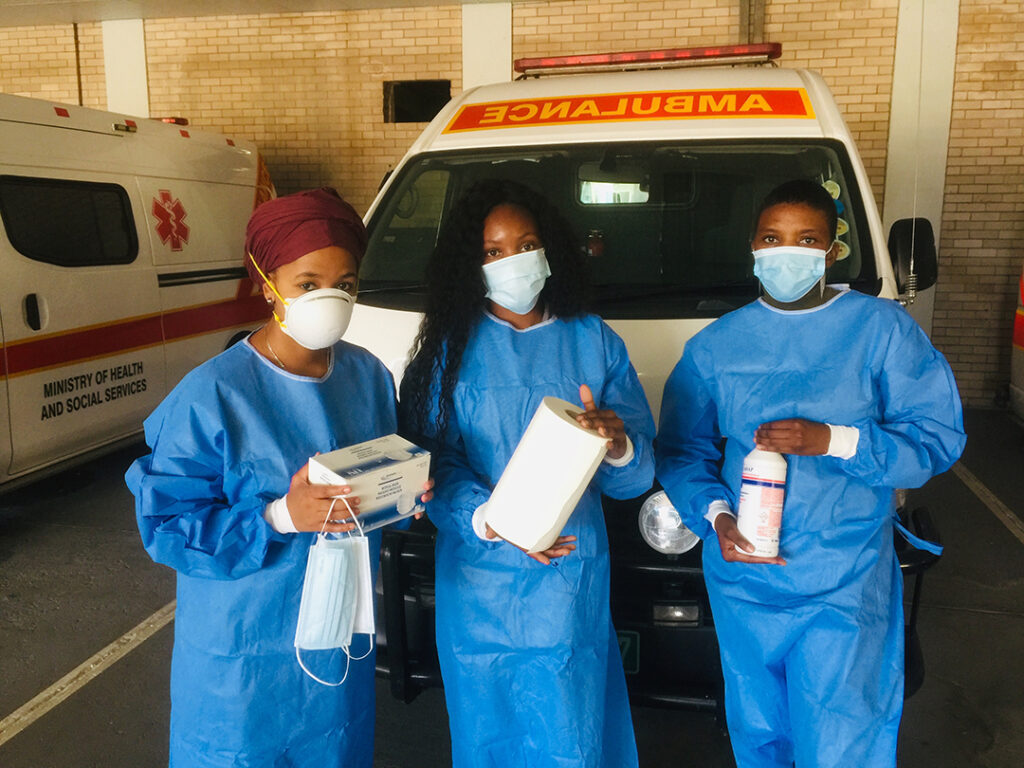ADF STAFF
Gripped in a devastating resurgence of COVID-19 infections, Namibia has the continent’s fastest-growing epidemic.
To help fight the disease on the front lines, the U.S. government recently donated personal protective equipment (PPE) and supplies worth $294,000 to Namibia’s Ministry of Health and Social Services.
The equipment, which was distributed to COVID-19 health care workers in facilities throughout Namibia over four weeks in May and June, includes 140,000 surgical masks, more than 25,000 N95 masks, 2,000 face shields, 87,000 gloves, 21,000 protective gowns and suits, 450 liters of antibacterial soap, and 12,000 paper towel rolls.
“I would like to reaffirm America’s commitment to supporting all Namibians during these challenging times,” U.S. Ambassador Lisa Johnson said in a June 11 statement. “We must prevent the spread of infection by wearing masks, washing our hands and keeping our distance. People over the age of 18 have the opportunity to get vaccinated against COVID-19, and this is a very important way to help stop the spread of the virus.”
The equipment was funded by the United States Agency for International Development (USAID). Since the pandemic began in March 2020, the U.S. government has increased support to the Ministry of Health and Social Services.
The PPE donation is part of USAID’s pandemic relief to Namibia valued at $750,000 and is in addition to the nearly $7 million of COVID-19 assistance for Namibia from the U.S. government, which the U.S. Embassy announced in April 2020.
At that time, President Hage Geingob expressed the country’s gratitude in a letter.
“The COVID-19 donation to Namibia is a continuation of the United States’ longstanding friendship with the people of Namibia and will go a long way in enhancing our capacity to prevent the spread of this global scourge in Namibia,” he wrote.
Namibia still faces a long, tumultuous road to combat the sharp increase in COVID-19 infections and death rates. The country had 84,705 confirmed cases and 1,400 deaths as of June 26, according to the Africa Centres for Disease Control and Prevention.
The more pressing concern is the dramatic rise in cases in June, culminating in back-to-back days on June 25 and 26 with more than 2,500 confirmed cases each — the highest daily totals since the pandemic began.
“We have the worst of the situation here. We never expected it,” Geingob told reporters on June 22 during a visit to two hospitals to assess the nation’s diminished oxygen supply.
The country’s health care system is under obvious stress from the third wave. Hospitals and mortuaries are overwhelmed, and vaccine doses are hard to come by.
Delivery delays forced the health ministry to temporarily suspend first doses in late June, while just about 116,000 of Namibia’s 2.5 million people have gotten a first dose.
Minister of Health and Social Services Kalumbi Shangula said one priority is to identify whether there is a new variant of COVID-19 in circulation.

